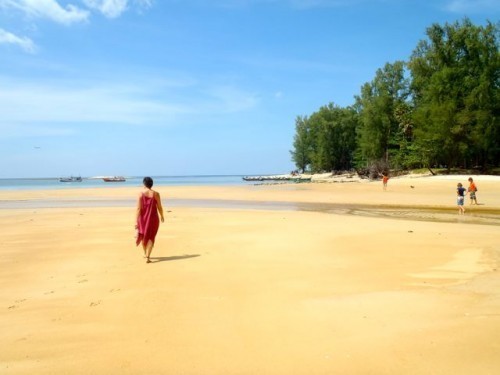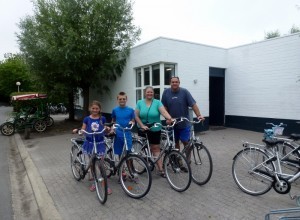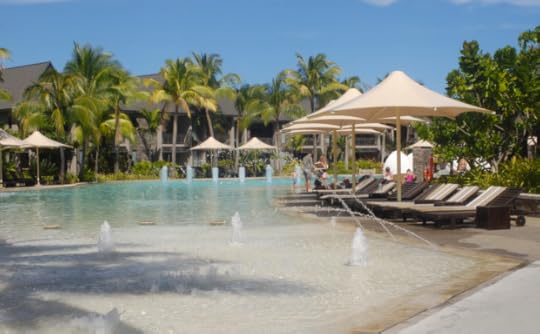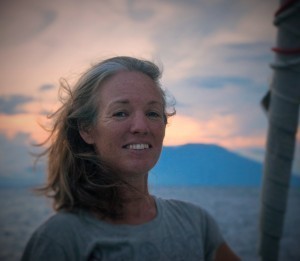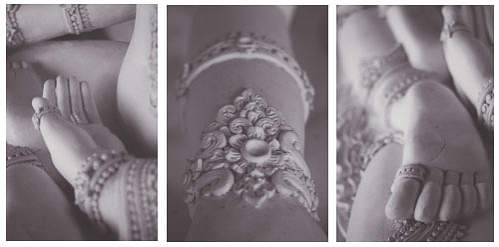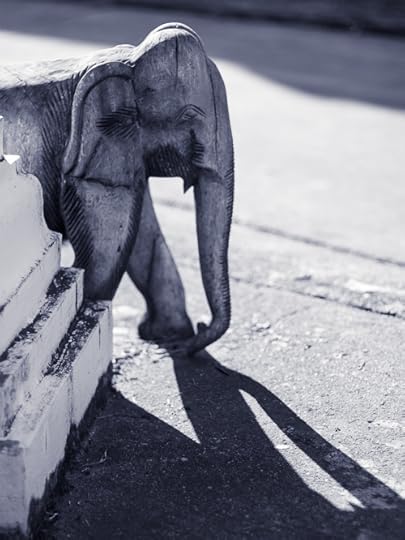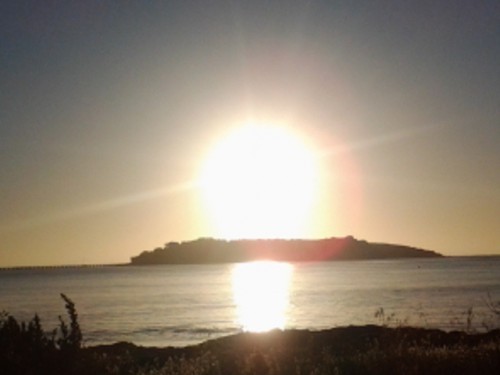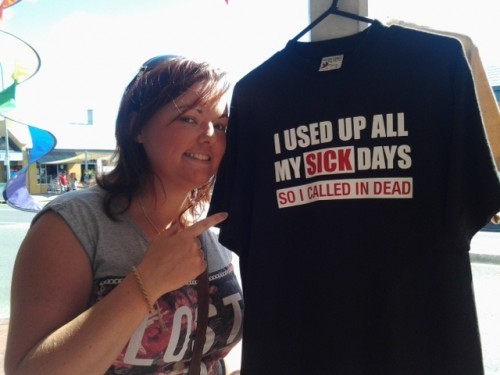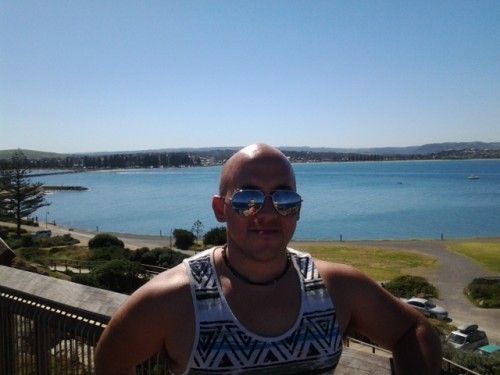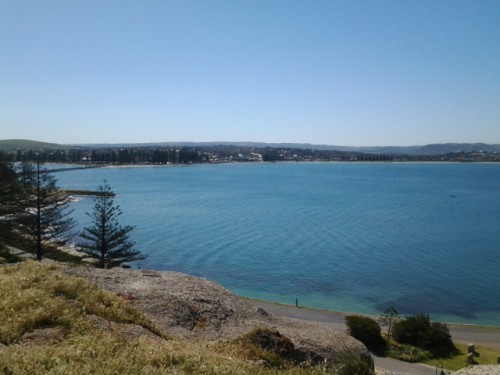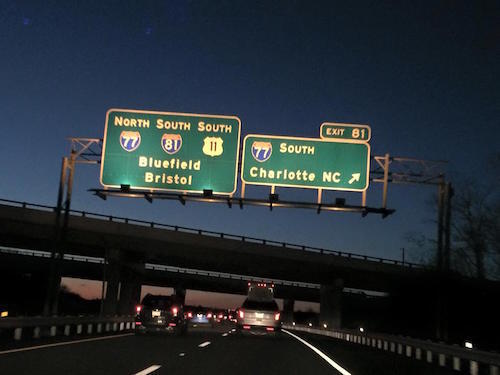Rolf Potts's Blog, page 17
January 25, 2015
The Age of Travel is not over
“There is a sniffy school of thought that promotes the idea that the age of travel is over, and that in 1946 when Evelyn Waugh published the juiciest selections from his travel books under the title When the Going Was Good, it was to be assumed that the going wasn’t good anymore. The book is very funny, but the thesis is faulty. I disagreed with it when I set off to see the world in the early ’60s, and I have felt over the years, and through a dozen books of travel, that it is a complacent and disprovable view.”
–Paul Theroux, “Dispatch From a Shrinking Planet,” Newsweek, May 15, 2011
Original article can be found here: The Age of Travel is not over
January 23, 2015
The difference: Living well vs. Doing well, Part 2
In a way, simplifying your life for vagabonding is easier than it sounds. This is because travel by its very nature demands simplicity. If you don’t believe this, just go home and try stuffing everything you own into a backpack. This will never work, because no matter how meagerly you live at home, you can’t match the scaled-down minimalism that travel requires. You can, however, set the process of reduction and simplification into motion while you’re still at home. This is useful on several levels: Not only does it help you to save up travel money, but it helps you realize how independent you are of your possessions and your routines. In this way, it prepares you mentally for the realities of the road, and makes travel a dynamic extension of the life-alterations you began at home.
“Travel can be a kind of monasticism on the move: On the road, we often live more simply, with no more possessions than we can carry, and surrendering ourselves to chance. This is what Camus meant when he said that “what gives value to travel is fear” — disruption, in other words, (or emancipation) from circumstance, and all the habits behind which we hide.
— Pico Iyer, “Why We Travel”
As with, say, giving up coffee, simplifying your life will require a somewhat difficult consumer withdrawal period. Fortunately, your impending travel experience will give you a very tangible and rewarding long-term goal that helps ease the discomfort. Over time, as you reap the sublime rewards of simplicity, you’ll begin to wonder how you ever put up with such a cluttered life in the first place.
On a basic level, there are three general methods to simplifying your life: stopping expansion, reining in your routine, and reducing clutter. The easiest part of this process is stopping expansion. This means that – in anticipation of vagabonding – you don’t add any new possessions to your life, regardless of how tempting they might seem. Naturally, this applies to things like cars and home entertainment systems, but this also applies to travel accessories. Indeed, one of the biggest mistakes people make in anticipation of vagabonding is to indulge in a vicarious travel buzz by investing in water filters, sleeping bags, and travel-boutique wardrobes. In reality, vagabonding runs smoothest on a bare minimum of gear – and even multi-year trips require little initial investment beyond sturdy footwear and a dependable travel bag or backpack.
While you’re curbing the material expansion of your life, you should also take pains to rein in the unnecessary expenses of your weekly routine. Simply put, this means living more humbly (even if you aren’t humble) and investing the difference into your travel fund. Instead of eating at restaurants, for instance, cook at home and pack a lunch to work or school. Instead of partying at nightclubs and going out to movies or pubs, entertain at home with friends or family. Wherever you see the chance to eliminate an expensive habit, take it. The money you save as a result will pay handsomely in travel time. In this way, I ate lot of baloney sandwiches (and missed out on a lot of grunge-era Seattle nightlife) while saving up for a vagabonding stint after college — but the ensuing eight months of freedom on the roads of North America more than made up for it.
“Very many people spend money in ways quite different from those that their natural tastes would enjoin, merely because the respect of their neighbors depends upon their possession of a good car and their ability to give good dinners. As a matter of fact, any man who can obviously afford a car but genuinely prefers travels or a good library will in the end be much more respected than if he behaved exactly like everyone else.”
— Bertrand Russell, The Conquest of Happiness
Perhaps the most challenging step in keeping things simple is to reduce clutter – to downsize what you already own. As Thoreau observed, downsizing can be the most vital step in winning the freedom to change your life: “I have in my mind that seemingly wealthy, but most terribly impoverished class of all,” he wrote in Walden, “who have accumulated dross, but know not how to use it, or get rid of it, and thus have forged their own golden or sliver fetters.”
How you reduce your “dross” in anticipation of travel will depend on your situation. If you’re young, odds are you haven’t accumulated enough to hold you down (which, incidentally, is a big reason why so many vagabonders tend to be young). If you’re not-so-young, you can re-create the carefree conditions of youth by jettisoning the things that aren’t necessary to your basic well-being. For much of what you own, garage sales and on-line auctions can do wonders to unclutter your life (and score you an extra bit of cash to boot). Homeowners can win their travel freedom by renting out their houses; those who rent accommodation can sell, store, or lend out the things that might bind them to one place.
An additional consideration in life-simplification is debt. As Laurel Lee wryly observed in Godspeed, “cities are full of those who have been caught in monthly payments for avocado green furniture sets.” Thus, if at all possible, don’t let avocado green furniture sets (or any other seemingly innocuous indulgence) dictate the course of your life by forcing you into ongoing cycles of production and consumption. If you’re already in debt, work your way out of it – and stay out. If you have a mortgage or other long-term debt, devise a situation (such as property rental) that allows you to be independent of its obligations for long periods of time. Being free from debt’s burdens simply gives you more vagabonding options.
And, for that matter, more life options.
* * *
“It is easy in the world to live after the world’s opinion; it is easy in solitude to live after your own; but the great man is he who in the midst of the crowd keeps with perfect sweetness the independence of solitude.”
— Ralph Waldo Emerson, “Self Reliance”
As you simplify your life and look forward to spending your new wealth of time, you’re likely to get a curious reaction from your friends and family. On one level, they will express enthusiasm for your impending adventures. But on another level, they might take your growing freedom as a subtle criticism of their own way of life. Because your fresh worldview might appear to call their own values into question (or, at least, force them to consider those values in a new light), they will tend to write you off as irresponsible and self-indulgent. Let them. As I’ve said before, vagabonding is not an ideology, a balm for societal ills, nor a token of social status. Vagabonding is, was, and always will be a private undertaking – and its goal is not to improve your life in relation to your neighbors, but in relation to yourself. Thus, if your neighbors consider your travels foolish, don’t waste your time trying to convince them otherwise. Instead, the only sensible reply is to quietly enrich your life with the myriad opportunities that vagabonding provides.
Interestingly, some of the harshest responses I’ve received in reaction to my vagabonding life have come while traveling. Once, at Armageddon (the site in Israel; not the battle at the end of the world), I met an American aeronautical engineer who was so tickled he had negotiated 5 days of free time into a Tel Aviv consulting trip that he spoke of little else as we walked through the ruined city. When I eventually mentioned that I’d been traveling around Asia for the past 18 months, he looked at me like I’d slapped him. “You must be filthy rich,” he said acidly. “Or maybe,” he added, giving me the once-over, “your mommy and daddy are.”
I tried to explain how two years of teaching English in Korea had funded my freedom, but the engineer would have none of it. Somehow, he couldn’t accept that two years of any kind of honest work could have funded 18 months (and counting) of travel. He didn’t even bother sticking around for the real kicker: In those 18 months of travel, my day-to-day costs were significantly cheaper than day-to-day life would have cost me back in the United States.
The secret to my extraordinary thrift was neither secret nor extraordinary: I had tapped into that vast well of free time simply by forgoing a few comforts as I traveled. Instead of luxury hotels, I slept in clean, basic hostels and guesthouses. Instead of flying from place to place, I took local buses, trains, and share-taxis. Instead of dining at fancy restaurants, I ate food from street-vendors and local cafeterias. Occasionally, I traveled on foot, slept out under the stars, and dined for free at the stubborn insistence of local hosts.
In what ultimately amounted to over two years of travel in Asia, Eastern Europe, and the Middle East, my lodging averaged out to just under $5 a night, my meals cost well under $1 a plate, and my total expenses rarely exceeded $1000 a month.
“When I was very young a big financier once asked me what I would like to do, and I said, ‘To travel.’ ‘Ah,’ he said, ‘it is very expensive; one must have a lot of money to do that.’ He was wrong. For there are two kinds of travelers; the Comfortable Voyager, round whom a cloud of voracious expenses hums all the time, and the man who shifts for himself and enjoys the little discomforts as a change from life’s routine.”
— Ralph Bagnold, Libyan Sands
Granted, I have simple tastes – and I didn’t linger long in expensive places – but there was nothing exceptional in the way I traveled. In fact, entire multi-national backpacker circuits (not to mention budget guidebook publishing empires) have been created by the simple abundance of such travel bargains in the developing world. For what it costs to fill your gas-tank back home, for example you can take a train from one end of China to the other. For the cost of a home-delivered pepperoni pizza, you can eat great meals for a week in Brazil. And, for a month’s rent in any major American city, you can spend a year in a beach hut in Indonesia. Moreover, even the industrialized parts of the world host enough hostel networks, bulk transportation discounts, and camping opportunities make long-term travel affordable.
Ultimately, you may well discover that vagabonding on the cheap becomes your favorite way to travel, even if given more expensive options. Indeed, not only does simplicity save you money and buy you time, it makes you more adventuresome, forces you into sincere contact with locals, and allows you the independence to follow your passions and curiosities down exciting new roads.
In this way, simplicity – both at home and on the road – affords you the time to seek renewed meaning in an oft-neglected commodity that can’t be bought at any price: life itself.
Excerpted from Tim Ferris’ blog, 05/12/2010
Original article can be found here: The difference: Living well vs. Doing well, Part 2
January 22, 2015
Vagabonding Case Study: The Wagoners
Age: 45, 49, 12, and 10, respectively
Hometown: I grew up in Nevada, Heidi grew up in California, and we started our family in Apex, North Carolina, so I guess I’ll use that as the “Family Hometown”.
Quote:
“The world is a book, and those who do not travel read only one page.” – Saint Augustine
How did you find out about Vagabonding, and how did you find it useful before and during the trip?
Once you start the life of travel there are certain “go to sites” that we all use and this is one of them. Great for networking and useful information.
How long were you on the road?
I’m glad to say, we’re still on the road! While we originally were happy at the thought of living in Spain for 12-18 months, we are now approaching 2 1/2 years! We switched continents are are now exploring Southeast Asia. We’re currently living in Thailand, and we’re about to explore Laos, Vietnam, Cambodia and more over the next 6 months.
Where did you go?
The answer is a long one. We were able to visit many places within Spain, but also visited Italy, France, Germany, Austria, Switzerland, Andorra, Belgium, Portugal, Morocco, England, Hungary, Gibraltar, Slovakia, Sweden, and the Netherlands to name a few, while we were in Europe. Now that we are in Southeast Asia, we will have many more great destinations in our future.
What was your job or source of travel funding for this journey?
Our source of travel funding has been a combination of savings, and money from our blog, books, etc. That in conjunction with keeping a reasonable budget while still doing and seeing some amazing things.
Did you work or volunteer on the road?
While we don’t work in the standard 9-5 sense of the word, maintaining our blog and generating great content is definitely a full time job. We do a bit of freelance work as well as some consulting for those interested in moving to Spain. We have written a couple of eBooks too!
While we don’t officially volunteer, we do like to spontaneously volunteer when an opportunity arises. For example, we were able to run an English class, while staying in the jungles of Northern Thailand for a couple of nights.
Of all the places you visited, which was your favorite?
Tough question! We couldn’t come to a consensus, so Lars liked Paris, Anya loved Spain, Heidi’s favorite is Amsterdam, and mine is Porto. I guess it’s great that we have so many favorites from which to choose.
Was there a place that was your least favorite, or most disappointing, or most challenging?
I will say at the outset that we’ve had very few disappointing travels. If you’re going to pin me down, I would probably say that Koh Chang, Thailand was the most disappointing. We had some great food there, and were able to walk on the beach, but it was just a bit too touristy for us. The monsoon season didn’t help either, with daily rains and rough seas.
Which travel gear proved most useful? Least useful?
Our most useful travel gear is definitely the computers. Without some sort of computer setup, it would be very difficult for us to update our blog, or scout out information on our next travel destination. This is also how we keep in touch with family and friends, as well as homeschool activities.
We’ve loaded up the kids’ laptops with movies and other activities, so that helps keep them occupied during downtime. As far as least useful, I would probably put down those “I might need this…” clothes.
When we moved to Spain, all of us brought a lot of clothes that we did not need. As we’re continuing our travels, and being more mobile, we’re really starting to get down to the absolute minimum clothing. Pack what you think you need, and then remove about 1/4 of it just before you go.
What are the rewards of the vagabonding lifestyle?
Experiencing the various cultures, and people, and sharing that with the kids. We have met so many different people and families during our travels, and it’s that human element that’s very rewarding. We’ve run into our fair share of bumps along the way, but the kids are learning life lessons that Heidi and I hope will help them throughout the rest of their lives. We are also making good friends around the globe.
What are the challenges and sacrifices of the vagabonding lifestyle?
Sometimes not knowing where you’re going to be living or what you’ll be doing the next month can be challenging. But it keeps things interesting. I think our biggest challenge as of late has been handling the kids’ education. If they were in the U.S., they would be in a public school, but we’re new to the homeschooling scenario, and we’re in the midst of getting into a rhythm with that.
As far as sacrificing, perhaps we’re missing out on having the latest phone or gadget, but we’ve grown accustomed to having a minimal footprint, so it’s not such a big deal.
What lessons did you learn on the road?
Keeping calm when adversity sets in. Coming together as a family to make decisions about a particular course of action. When traveling in different countries, you would be amazed at how far a little knowledge of the local language will get you. If you make an effort to use native words or phrases, the locals are very receptive and helpful.
How did your personal definition of “vagabonding” develop over the course of the trip?
It’s funny you ask this. Lars and I were walking to the store and having a discussion about our definition of what and where “home” is. As a Vagabonder (is that a word?), we came to the conclusion that wherever you are is home. Time allows you to shed some of the layers of what you have been taught as “normal” and realize you get to make your own reality. Also with time, we have become more relaxed and don’t feel the need to plan for everything unexpected.
If there was one thing you could have told yourself before the trip, what would it be?
Go with the flow. A lot of times, people build up expectations about a particular place or activity. And there can be apprehension or disappointment when those expectations are not met. Being flexible in the moment can help alleviate that stress. It’s but a moment in time.
Any advice or tips for someone hoping to embark on a similar adventure?
Go for it! It’s definitely something you can do. It takes a lot of planning, and in our case, we went from a consumer/gatherer attitude, to a lifestyle of simplification. We are living on less than half of what we were in the USA and we are living the life of travel and experience.
When and where do you think you’ll take your next long-term journey?
We are going to be exploring Southeast Asia over the next 6 months to a year. The plan was to return to Spain, but then we kind of have our sights on Australia or maybe Indonesia. Who knows, we are leaving all doors open for new opportunities. Our goal is to travel as long as we still love doing it.
Read more about The Wagoners on their blog, Wagoners Abroad , or follow them on Facebook and Twitter.
Website: Wagoners Abroad
Twitter: @WagonersAbroad
Are you a Vagabonding reader planning, in the middle of, or returning from a journey? Would you like your travel blog or website to be featured on Vagabonding Case Studies? If so, drop us a line at casestudies@vagabonding.net and tell us a little about yourself.
Original article can be found here: Vagabonding Case Study: The Wagoners
January 21, 2015
What travel hacking isn’t
While I already have quite a few posts about what travel hacking is, I think ultra-beginners to the topic can benefit from hearing about it in a context of what it ISN’T as well. Because to be honest, the media has picked up on bits and pieces of the travel hacking hobby and…as is often the case with the media…twisted it into the most sensationalist version possible.
For instance my husband and I were approached by a TV scout once and it was painfully obvious that he wanted the travel hacking of days past. He wanted us to have stories of digging through airport trash-cans for ticket stubs we could turn in for miles.
Well that’s (mostly) not how it works anymore.
So in case you too have heard bits and pieces about travel hacking from the media, let me clarify what it isn’t.
1.) Travel hacking is not illegal.
If you’ve heard about the unfortunate situation Aktarer Zaman is now dealing with because of a computer program he was using to help people book “throw away tickets” that would make their trips cheaper, this point may seem a bit confusing.
But let’s be clear about the fact that there is a difference between breaking a law and breaking terms and conditions of a program/product or service. Technically the strategy Zaman was using on a large scale was against United’s terms and conditions. (Article II, Item 31 includes “throwaway ticketing” in the definition of “prohibited practices.) So that means United absolutely has a problem with what he is doing and can absolutely attempt to sue him if they wish.
But Zaman’s “throwaway ticket strategy” is one thing. Basic travel hacking is another.
Most travel hacking practices are NOT in violation of terms and conditions and are instead simply designed to take full advantage of existing benefits. For instance getting a credit card with a mileage bonus even if you aren’t otherwise interested in the card. This is the most common travel hacking strategy for earning miles and is neither against terms and conditions nor illegal. It’s simply intentional.
But aside from the debate of whether or not these practices are or are not against terms and conditions, travel hacking strategies are not against the law. It is not illegal to collect and use points, even if you do so obsessively. It is not illegal to do what you want with your own credit, applying for or canceling cards as you wish.
2.) Travel hacking did indeed inspire the pudding-cup part of “Punch Drunk Love”, but it’s hardly ever that interesting anymore.
Once upon a time “Healthy Choice” decided to give away a certain amount of miles for various products if you mailed in the labels. A man who the travel-hacker community calls “Pudding Guy” discovered the cheapest item included in the promotion was a 25 cent pudding cup so he went all out and bought over a million miles’ worth of pudding cups. You can read more about his incredible story on his wikipedia page and of course, you can catch the reference in Adam Sandler’s Punch Drunk Love.
His is not the only amusing story about mileage enthusiasts buying pallets of food they didn’t intend on eating because of mileage promotions, but I don’t expect many more for current or future enthusiasts.
Why? That’s just not the trend of marketing these days for products outside of the credit-card world. More and more mileage earning opportunities are appearing in credit-card bonuses and spending rather than other markets.
Perhaps a new movie will come out including a scene inspired by obsessive credit-card collection, but I doubt it will seem as entertaining as the obsessive collection of pudding cups.
3.) Travel hacking isn’t the “extreme couponing” of travel because not everyone can do it.
Many people have compared travel-hacking to extreme couponing, but the truth is there is one very important difference between travel hacking and extreme couponing. Not just anyone can be a travel hacker.
The core strategies of travel hacking are accumulating miles via credit cards. This means you need to have a good credit score to get anywhere in this hobby. Sure, there are few strategies that don’t require a good credit score, but the bulk of travel-hacking comes down to collecting rewards credit-cards. And these are the kinds of credit cards that will require good credit.
Not to mention it is significantly more difficult for non-US residents to pursue travel-hacking. Again, this has to do with the trends we see in various marketing strategies as well as the credit-card culture of various countries. Europe for instance just does not have the same kind of credit-card culture that we do in the US.
4.) Travel hacking isn’t backpacking.
If you’re earning hotel points in addition to frequent flyer miles, you will find yourself staying in fewer and fewer hostels. Why? Because they’re honestly not as cheap as the free luxury hotel you could get by using hotel-points.
Ironic as it is, it’s true. We spent over a week at the InterContinental Fiji for free using points.
Now, sometimes I kind of miss the social aspect of hostel-life. It certainly serves a purpose other than just budget. But when I want a free place to stay, the luxury hotel is where I’ll be.
Maybe this article doesn’t spell out exactly what travel-hacking is, but hopefully if you thought you knew what it was, this article has helped to clarify some of the common misconceptions.
Original article can be found here: What travel hacking isn’t
January 20, 2015
Vagabonding Case Study: Behan Gifford
Age: 44
Hometown: Bainbridge Island, Washington, USA
Quote: At sea, I learned how little a person needs, not how much. -Robin Lee Graham
How did you find out about Vagabonding, and how did you find it useful before and during the trip? I first encountered Vagabonding via Vagablogging, after we’d departed on our trip: it’s an inspiration place to connect and learn from the perspectives of other vagabond-style travelers like our family. A place for inspiration and a place where I can go to find my virtual tribe, and feel a little less crazy.
How long were you on the road?
So far, it’s been six years, ten weeks, one day…and counting!
Where did you go?
I travel via sailboat, with my family. We sailed first from the US to Mexico and spent a year and a half along the Pacific coast of Mexico. Ready for a blue horizon, sailed south and west across the Pacific (via many islands), paused in Australia to put some coin back in our pockets, and later sailed up through Papua New Guinea and into Southeast Asia.
What was your job or source of travel funding for this journey?
Prior to departure, I worked in digital media, and my husband worked in medical equipment. We saved hard for about six years and lived off our savings for the first few years. Those savings are long gone: our ongoing travels are funded through freelance writing, and from my husband’s work as a sailmaker.
Did you work or volunteer on the road?
We look for opportunities as we go: traveling as a family with three children closes a few doors but opens others. Having kids, it’s most typical for us is to seek opportunities to volunteer in schools along the way. We’ve taught English language classes, brought a microscope and prepared slides we carry for science classes, or just cultural exchanges to talk about our travels.
Of all the places you visited, which was your favorite?
It is impossible to play favorites, and our family is always changing up the mix of favorites as our travels continue. The crowd favorite vacillates between Mexico’s Sea of Cortez, or the uninhabited Suwarrow atoll in the Cook Islands. Personally, I keep coming back to the little islands off Papua New Guinea where we spent several months sailing in 2012. It is by far the most removed from the cultural context I grew up with, a beautiful place with a dark side that prompted a lot of introspection… while surrounded by friendly people in a stunning environment.
Was there a place that was your least favorite, or most disappointing, or most challenging?
We expected to like Australia much more than we did, and I suppose that was disappointing, but this may also be attributed to the shift from nomadic living to stationary land-job-tied living, which no longer fit us very well. It was also challenging in its false familiarity: we were in a place where people looked more like us, and talked kind of like us, but could have startlingly different cultural norms.
Which travel gear proved most useful? Least useful?
A tablet is invaluable for us: it is a navigation tool, with nautical charts of the world, it is the communication device that lets us phone home, and of course, it’s excellent for entertainment. We used to joke about using “iPad diplomacy” to befriend kids of all ages in some of the islands where we had few words in common. Imagine introduce touch screen navigation to someone who hasn’t seen a computer before through a couple of visual games.
What are the rewards of the vagabonding lifestyle?
We can live our ideals, which is tremendously rewarding. We wanted to live close to nature, sourcing power through the sun and wind, and raise our children in tune with the environment. This lifestyle allows them to grow up as citizens of the world with a broader view of the opportunities and challenge that presents.
What are the challenges and sacrifices of the vagabonding lifestyle?
It’s hard for me to be far away from friends and family that Iove. We can’t afford to go home for visits, so we miss them a great deal. We don’t get to go to the graduations and weddings and funerals. I miss being present to comfort a friend dying of cancer. I miss the little ways friends get to help each other out.
What lessons did you learn on the road?
How incredibly lucky I am to have won the lottery in life, with health, education, opportunity, that allows me to follow this path.
How did your personal definition of “vagabonding” develop over the course of the trip?
It’s evolved as we’ve developed an identity as more permanent travelers. Home becomes more and more the place we create in the circle around our family, wherever we are. I still feel a bond to our origin home- Bainbridge Island, Washington, and to friends there- but I have come to acknowledge that I make this home in every stop along the way now as well.
If there was one thing you could have told yourself before the trip, what would it be?
Save more and start sooner- your life is waiting!
Any advice or tips for someone hoping to embark on a similar adventure?
The hardest part is taking the leap. Think very, very hard about whatever you think is more important right now, that’s preventing you from adventuring, in the context of looking back on your life in 20 years. If you still want to go, set a date. Having a date to depart is a powerful way to mentally line your life up around the goal of vagabonding and will trickle down to influence the everday choices you make to close the distance to your departure.
When and where do you think you’ll take your next long-term journey?
I’m incredibly grateful to still be on the journey. But even ongoing journeys have their inflection points, and I have a big one coming up in just a few months. After spending a year along the Andaman coast of peninsular Malaysia and Thailand, in January I sail west, bound for Sri Lanka in the first stage of a ten month voyage to Africa.
Read more about Behan on her blog, Sailing Totem , or follow her on Facebook and Twitter.
Website: Sailing Totem
Twitter: @sailingtotem
Are you a Vagabonding reader planning, in the middle of, or returning from a journey? Would you like your travel blog or website to be featured on Vagabonding Case Studies? If so, drop us a line at casestudies@vagabonding.net and tell us a little about yourself.
Original article can be found here: Vagabonding Case Study: Behan Gifford
January 18, 2015
What you see on large news channels is not the only news
“What you see on large news channels is not the only truth, or even the only news. In fact, often it is the bad news. If you want to hear the good news, then travel. People are basically good and worth knowing, whatever the race or culture they hail from.”
–Mike Spencer Bown, What I’ve Learned: The World’s Most Traveled Man, Esquire, October 25, 2013
Original article can be found here: What you see on large news channels is not the only news
January 17, 2015
Solo travel when you’re not traveling solo
Traveling slowly with my husband across Southeast Asia has been a great way to leave our jobs and lives in Canada behind to explore the world on a small budget. It also means we spend a lot of time together. Every meal, every walk, every bus ride to a new city, is together. Where once we saw each other only in the evenings and on weekends, we now see each other all the time. Where we once had schedules and habitual activities alone, there was now a much more shared and aligned schedule. This is fine, really, but we don’t always agree that something is worth our time or energy. Sometimes we need to split off and spend some time apart.
When we were living in Chiang Mai, Thailand, I felt the need to take our scooter to some neighboring towns to see other temples, other roads, other food stalls. This little adventure interested only me so I took off down the highway with the scooter and left the husband behind to revel in his alone time with his fantasy football activities. I put a single earbud in, had Google maps speak directions to me and put on some music. I immediately got lost on a small residential road due to my inability to grasp the distance of 200 metres and turned too soon. I almost ran over a chicken that was literally crossing the road (why it was crossing the road is beyond us all.) Once back on the highway, I decided to trust the navigator voice and made my way south on Highway 106 to Lamphun. The drive passed under towering rubber trees that lined the road and went in and out of clouds of incense and smoke from barbecued pork. Each rotund tree had an orange swatch of fabric tied to it, indicating it was blessed by monks, therefore protecting it from logging. The roots had overgrown past the road and were pushing up the pavement along the edges. I took it slow and drove only as fast as I wanted with Blood Orange’s Chamakay setting the mood.
I stopped at a couple of different wats (temples) in Lamphun: Wat Phra That Hariphunchai and Wat Kukut respectively. The first was almost deserted compared to the wats I had visited in Chiang Mai. No more than four tourists and about five or so Buddhist monks were wandering the grounds. This was a much more peaceful way to visit a wat than pushed around in a throng of tourists, constantly moving and talking over each other. Little bells blew around in the wind and broke the silence with soft tinkling sounds like wind chimes. Wat Kukut was completely deserted. The only human I saw was a Thai man who came into the front gates briefly to release a small bird from a tiny wicker cage and then leave. I had a great opportunity to take my time and photograph every small detail that fascinated me: small wooden elephants casting long shadows, tiny figurines placed in flower pots and along walls, standing Buddhas along the walls of the chedis, catching just the right amount of light on my lens.
On the way back to Chiang Mai, I waited at a stoplight and saw a small girl staring at me from the car beside me. She shyly opened her window and waved. I waved back from my scooter with a big smile and saw the delight in her face right as the light turned and I sped off up the rubber tree highway, Kanye West’s Bad News taking me home.
Had my husband been with me, this day trip would have looked quite different. On the back of our scooter I would have been navigator, looking at my phone and directing rather than driving at my own pace, stopping whenever I wanted, and taking my time in the deserted wats. I probably wouldn’t have had my headphones in. Sometimes it’s nice to have a soundtrack of my favorite music to accompany an experience. It was nice to have a day that was my own with my own agenda. If we had been on a short two-week vacation, we would have been rushing to maximize our time and fit as many activities into our schedule as possible. A day trip to Lamphun wouldn’t have been considered when there are flashier attractions nearby that we would both enjoy. It’s a healthy exercise to spend time alone and be forced to rely on your own strengths and spend time with your thoughts as you travel. Growing up as an only child, this was standard. Spending time alone used to come so naturally to me. Since being married, I can sometimes forget the way my brain works and thinks differently alone. While it is an incredible journey my husband and I have taken on together, having a solo adventure here and there has enriched the overall experience.
To read more about Maryanne’s travel adventures check out Unknown Home.
Original article can be found here: Solo travel when you’re not traveling solo
January 16, 2015
Vagabonding Case Study: Jarryd Salem
nomadasaurus.com 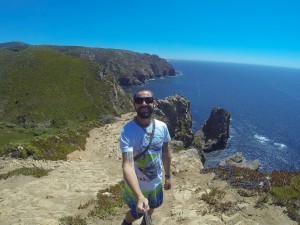
Age: 27
Hometown: Sydney, Australia
Quote: “Two roads diverged in a wood and I – I took the one less traveled by, and that has made all the difference.” – Robert Frost
How did you find out about Vagabonding, and how did you find it useful before and during the trip?
I was working back in Australia saving for my current trip. I was getting really jaded with life, thinking that I was never going to reach my idealistic monetary goal before I could leave again. I did some research on books to inspire and motivate me and Rolf Potts’ ‘Vagabonding’ kept coming up. I ordered it online and read it in the month leading up to me finally leaving. It helped reaffirm my ideas that leaving my home country again was the right path for me.
How long were you on the road?
Since leaving Australia in 2007, I have spent about 4.5 years overseas traveling and working. At the moment I am 9 months into my new adventure, backpacking overland from SE Asia to South Africa without using any air transportation.
Where did you go?
I moved to Canada for my first solo trip overseas, then returned a second time. I loved the Great White North, and met my current girlfriend, Alesha, there 6 years ago. After Canada we spent 8 months backpacking around Central America and are now based in South East Asia.
What was your job or source of travel funding for this journey?
I worked primarily in the construction industry in Australia to help fund this journey. A range of different jobs ranging from residential building, machine operating, heavy transportation and civil construction.
Did you work or volunteer on the road?
In Canada I worked a lot during Summer and as little as possible in Winter. I just wanted to make sure I had enough money to fund my snowboarding and partying lifestyle when I was younger. Now I am trying to make a living from travel writing and blogging.
Of all the places you visited, which was your favorite?
I would have to say Guatemala. The people were so patient and welcoming, despite their turbulent past. The landscapes were varied and captivating and I fell in love with the Spanish language. A fascinating place that constantly surprised me everyday.
Was there a place that was your least favorite, or most disappointing, or most challenging?
Definitely not a least favorite, but Myanmar was by far the most challenging. As the country has only recently been opened up to tourism there is very little infrastructure setup for travelers. I love this kind of travel, but the mix between highly dangerous transportation options, the difficulty in finding food in some towns and constantly being approached by curious people proved to be challenging. That being said I would go back in a heartbeat.
Which travel gear proved most useful? Least useful?
Definitely my Leatherman multi-tool. I have had mine since before I started traveling in 2007 and still use it to this day. Whether it is cutting up fruit or fixing parts on my motorcycle, it has proved to be invaluable. Least useful is some straps I bought to tie my smaller backpack to my larger one, thinking it would make long walks between stations and hostels easier. I haven’t used them once.
What are the rewards of the vagabonding lifestyle?
Constantly evolving the way you interpret situations and value experiences. Becoming more aware and tolerant of different cultures. Pushing the limits of your comfort zone to the point where very little worries you anymore. I look at how much I have changed and who I have become today, compared to the person that first left home in 2007, and I am immensely satisfied. The vagabonding lifestyle has allowed me to appreciate the small things in life and become a better person.
What are the challenges and sacrifices of the vagabonding lifestyle?
Having fleeting friendships with people. Even though I have made plenty of lifelong friends over the years, most of these great people I have only spent a couple of hours, days or weeks with. It makes it hard to actually get to know anyone on a deeply personal level. Having little routine in life is also a blessing and a curse. I love that every day is different, but sometimes I long for some form of structure in life. But only sometimes.
What lessons did you learn on the road?
Trusting my instincts is a big one. Also to be more open to different opinions and ideas. I never realized how closed-minded I was until I started traveling, and being on the road taught me to see the worth in every person.
How did your personal definition of “vagabonding” develop over the course of the trip?
I never used to view vagabonding as a way of life really. To me it was just “being on the road”. That has changed since I have been on this current trip. I have started to develop the notion that “vagabonding” is a mindset, a mission, an attitude and passion. It is longing to pursue your dreams, and striving to achieve them no matter what the obstacles It is seeing the world through fresh eyes and respecting every piece of it. It truly is a way of life.
If there was one thing you could have told yourself before the trip, what would it be?
Say yes more.
Any advice or tips for someone hoping to embark on a similar adventure?
Decide if it is something that you actually want to do. Think about what you want to achieve from embarking on a new adventure. Picture yourself not just in the incredible situations, but also the stressful. Ask yourself if you want to grow as a person and in what way. If you have questioned yourself on these things and still want to become a vagabond, do everything in your willpower to make it happen. Keep your eye on the goal and never except no for an answer. Your soul will thank you for it.
When and where do you think you’ll take your next long-term journey?
I am already on my next long-term journey. While the ultimate goal is the one of backpacking overland with my girlfriend from Thailand to South Africa without using any air transportation, the current mini-journey-inside-a-journey has been traveling around and riding a cheap Chinese motorcycle in South East Asia for the last 9 months. With no ‘end date’ in sight, the adventure continues, and vagabonding is now my way of life.
Read more about Jarryd on his blog, NOMADasaurus , or follow him on Facebook and Twitter.
Website: NOMADasaurus
Twitter: @NOMADasaurus
Are you a Vagabonding reader planning, in the middle of, or returning from a journey? Would you like your travel blog or website to be featured on Vagabonding Case Studies? If so, drop us a line at casestudies@vagabonding.net and tell us a little about yourself.
Original article can be found here: Vagabonding Case Study: Jarryd Salem
January 15, 2015
Field Report: Port Lincoln, Australia
Cost per day?
We camped at the Big 4 campsite which was a fantastic campsite, but you can pay through the nose in peak season. We paid $40 a night but were reasonably central. There are various other sites but if you want to enjoy a drink or just a short stroll into town then you could find yourself too far out to walk. The campsite also had great kitchen and BBQ facilities, so cooking was cheap, however part of the appeal of Port Lincoln is its various bars and restaurants, as well as its entertainment. I would say $100 a day would get you a great day out.
Describe a typical day?
Port Lincoln is beautiful and needs to be explored, so I put on my running boots and ventured out. The local council seem to have invested a lot of money in taking care of its water front. The agriculture is well maintained from the great pines to the grassy lawns, everything feels fresh and alive. The great weather gave a fantastic glow to the area and the aroma of fresh sea air allowed you to grasp what makes this town truly fantastic. Rolling hills stretch up to the skies and made for a good run which gave astonishing views of the town. Unintentionally I found myself lost, however that was half the joy. I didn’t need an excuse to explore further and found myself running the beach track back to the campsite.
Catching up with my better half, we decided to make our way out to the various viewpoints that look over Port Lincoln. The walking trail was quiet, which was a great opportunity to take in the beauty of the town below. It’s not a long walk but is worth it for a romantic stroll. We took many pictures to capture these beautiful moments.
Time to undo all my hard work, we strolled into town for afternoon lunch. A pub on the local green served chicken parmagana with unlimited salad bar which we washed down with a beer. We sat out on the terrace looking out on the green. The lawns of the town centre were busy with various families, tourists, and locals gathered eating picnics and ice creams. The mood was joyous as we sat and watched the world go by. A small funfair was in town so rides lined the waterfront, the sounds of laughter and excited screams filled the air.
Well fed, we took a look round the various shops. Like most Australian seaside towns the shops would sell merchandise that would let you know just how great they thought their town was. Every other shop would sell various t-shirts, fridge magnets, bumper stickers etc. tagged with Port Lincoln insignia – we bought a sticker for the camper and strolled back to the lawns. Treating ourselves to an ice cream we sat on the grass and lapped up the sun.
Stopping by the local butchers it was time to grab some burgers and sausages and head back to the campsite. We watched the sun go down by the pool. The Big 4 put on a film each night through its outside cinema. We sat back and enjoyed a BBQ and a film. The night was mild and various holiday makers sat around the pool and BBQ area eating and drinking. So we night capped with a glass of wine before retiring to bed.
What did you like? Dislike?
I couldn’t find anything I didn’t like, if anything there is little in the way of tours but this wasn’t an issue, the appeal is the town itself. However, there are various activities to enjoy. I loved the great atmosphere and the friendly service we came to find. The great couple that ran the campsite were lovely and had a lot of time for guests. It was obvious they had invested a lot of time in bringing up the standard of the site. The town was beautiful.
Describe an interesting conversation?
The couple that ran the campsite had settled some years ago after leaving England in order to tour Australia. A spontaneous decision had led them to turn their whole life around and eventually to run this campsite. He had been a lorry driver that was struck off and out of work, with little else to lose they had decided they would to take the risk to move to the southern hemisphere and neither have ever looked back. It was inspiring as you could clearly see their happiness shine through and above all you could see they were a truly happy couple. It just goes to show you can find happiness if your willing to take a risk for it.
Where next?
Sydney for New Year!!!!
Original article can be found here: Field Report: Port Lincoln, Australia
January 14, 2015
Do short trips have their own value?
We long-term travelers sometimes get caught up in the length of a trip. We advocate taking a year to backpack, using a summer break to explore the far corners of the earth, and digging into a new culture for longer than the average winter break from school. There is a reason we do this- long-term travel has limitless benefits. But what about the shorter trip? The weekend getaway, the week spent across the border, the brief vacation between longer journeys? We forget sometimes that these shorter trips have benefits as well.
Brief trips can be windows into what we want to see next. For some, shorter trips are like dipping their toes in the water to see what they can do, what they can handle. For others, shorter trips can be a respite from the day to day- even if the day to day is being experienced on the road. As any long-term traveler knows, traveling quickly resembles any other “normal” life in many ways. Bills still have to be paid, planning must be done, visas need to be obtained or renewed, hostel rooms must be cleaned, dentists may need to be visited. Of course there are long walks on beaches, spectacular sunsets, unbelievable meals, personal growth on many levels, and conversations with locals that go on for hours but long-term travel is not always glamorous and for many it’s just… life!
So why do we turn our collective noses up when others describe shorter trips? After all, more than one of us has visited a hot spring in Guatemala to “get away” for the weekend and many of us have taken advantage of a visa run across the border to enjoy a brief “vacation” of sorts. If even we, the never-conform-travel-until-we-drop tribe, need a brief change of scenery every now and then, why do we deny the same need in those who live the “normal” life?
There is no denying the benefits of long-term travel and I am admittedly one of “those people” who thinks everyone should take a genuinely long trip at least once in their lives, thinks every education should include a major travel component before it is considered “completed”, and believes that exploring unfamiliar countries, corners, cultures, and cuisines is best done in a deep manner without regard or how many stamps have been collected. I believe in long-term travel as much as the next traveler. But I also recognize the regenerative nature of the short trip.
I am currently writing in Fort Myers, Florida. It is not exactly my idea of a dream destination but it is warm and sunny none the less. We will only be here for a few short days- hardly long-term travel. Previous to this, my husband and I traded our constant journeying to spend one year, somewhat cooped up in upstate NY, homeschooling two lovely young people. The experience of co-creating individualized educations for two unique individuals is wonderful. Right now, it also happens to be hard work in a cold area of the world. The snow hits our tiny area and we can’t even get out of the driveway. My wanderlust is screaming from within on most days. There is so much I love about how we spend our days and yet… there is so very much I need a break from. So, we packed up the car and drove all the way down to Florida to visit family, get re-accqauinted with Vitamin D, and, most importantly, to enjoy a change of scenery. Do I wish I were in Thailand, snorkeling by day and enjoying a coconut by night? Do I wish I were planning our next visa run, getting ready to cross another border? Sometimes. But for now, a day spent on the beach, searching for shells, is enough to recharge these batteries.
Sometimes I think there is a belief that if you can’t get away for months at a time that it “isn’t worth it”. I wonder what “it” is because sometimes a short trip can lift spirits, bring already existent perspective into focus, and make life seem exciting again. All of those “its” are certainly worth something!
How many of us can think back to our first weekend in NYC, our first week spent on the beach in Costa Rica, our first three week cross-country trip with family, our first weekend camping trip, our first class trip to France? Even those short trips were enough to get us excited about exploring and planted the very first seeds of wanderlust. Digging deep into a foreign land and culture is beyond amazing but, in truth, feeling that wonderful sense of freedom as you drive coast to coast, in a borrowed car, within the boundaries of your own home country can be pretty amazing as well.
Life is truly a journey. It cannot really be broken up into segments of experiences as it all flows together and creates the one unique path we are traveling. Short or long, any travel is a part of shaping our experience of the world. Next time your cousin tells you he is headed to Mexico for a week, fight the urge to tell him it “isn’t worth it” unless he can go for longer. Instead, smile, wish him well, and take joy in knowing that he will soon experience a break from his own “norm”- a break that just might expand any number of things for him. If you can muster that, than maybe you can cross your fingers that his wanderlust will grow  If it doesn’t, at least you know you might have a buddy for those mini-breaks you’ll inevitably need from your own long-term journeys!
If it doesn’t, at least you know you might have a buddy for those mini-breaks you’ll inevitably need from your own long-term journeys!
What do you think? Do short trips have their own value?
Original article can be found here: Do short trips have their own value?
Rolf Potts's Blog
- Rolf Potts's profile
- 323 followers


